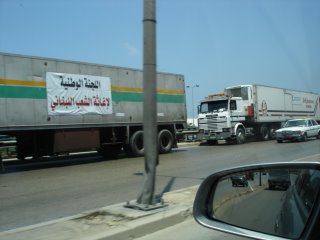 (The picture taken by Marion shows an aid convoys arriving in Beirut) Latest report from Marion in Beirut. I should add that just after I got the report this morning she sent a text message saying that no one had slept last night as there was heavy bombing once again of the Dahiyeh area of Southern Beirut, and Israeli planes above through the night. Also an area near her office was hit by bombs. The New York Times has this graphic using satellite imagery showing the area of Beirut where Hezbollah is based before and since the bombing.
(The picture taken by Marion shows an aid convoys arriving in Beirut) Latest report from Marion in Beirut. I should add that just after I got the report this morning she sent a text message saying that no one had slept last night as there was heavy bombing once again of the Dahiyeh area of Southern Beirut, and Israeli planes above through the night. Also an area near her office was hit by bombs. The New York Times has this graphic using satellite imagery showing the area of Beirut where Hezbollah is based before and since the bombing.Friday 4th of August 2006:
A few days ago, it was the pollution of sea shores that dominated our TV news and the front pages of our newspapers. And before the Lebanese were capable of coping with this, the next big crisis has occurred: shortage of petrol in the country!
Lebanese people are accustomed to war, so everyone knows the two most important things you rush to buy when fighting starts is food for home and petrol for your car. This war was no exception. As people rushed to buy petrol, the government assured the public that there was good stock of petrol in the country, sufficient for one month. Yet for the last couple of days it seemed that alarm bell were ringing. Long queues of cars waiting hours at the petrol stations. The scene was the same in Beirut as across the whole country. I had the chance to take few pictures of various petrol stations in the Capital. Somehow I was a bit surprised to see a lot of petrol stations that used to open 24hours/day were now closed with red tapes blocking off the forecourts. Were they out of petrol stock? Or were they closing in order to make their depleted stocks last longer? Was all this crisis on petrol just an illusion from people? I carried out my investigations, checking out the newspapers and speaking to the manager of one station. I was informed that the petrol in this station will last only one more week and as I expected, the closing hours during the day were in order not to run through the supplies too quickly.
Almost all the stations as stated in the newspapers, were selling only small amounts of fuel to each customer each time. So in order to get a totally full petrol tank you would have to visit the station many times. On Monday, the petrol station association in the country met with the UN representatives in order to establish a secure passage to import more petrol. There is still no feedback about this matter. Additionally the Ambassador of the United States top Lebanon, after having met our foreign minister Fawzi Salloukh, stated that their discussions had been on the handling of important humanitarian supplies along with the petrol and other fuels for Lebanon. The Jordanian Minister for Foreign Affairs Abdelelah Al-Khatib when visiting Beirut recently promised that Jordan would also send petrol to Lebanon. Surprisingly, Syria from its side also announced its readiness to sell to Lebanon extra stocks of its petrol. I am sure that the Lebanese government is unlikely to take up Syria’s offer.
Whilst on the subject of Syria: one of my Muslim colleagues at work who left Lebanon for Syria at the beginning of the war, came back a few days ago telling us that the Syrians harassed her and her family whilst there. They told her that this war had only happened because Syria had been forced out of Lebanon, adding that soon Lebanese people will beg Syrians troops to enter the country again in order to stop this war. Hearing this news was very frustrating! Yet it is to be expected from a country that sucked Lebanon’s blood for many years until the Lebanese had the guts to push them out after the tragic death of Rafik Hariri.
Now back to the Israeli war on Lebanon, I came across an interesting statistics on the losses. Until 1st of August, Losses are estimated as follows:
-INFRASTRUCTURE:
-Roads: USD 349 million
-Airports: USD 55 million
-Electricity: USD 208million
-Telecommunication: USD 99million
-Water stations: USD 74million
-HOMES & BUSINESS COMPANIES:
USD 1.464 billion
-INDUSTRIAL COMPANIES:
USD 190 million
-PETROL STOCKAGE & PETROL STATIONS:
USD 10 million
-LEBANESE ARMY LOSSES:
USD16 million
TOTAL LOSSES: USD 2.465 billion.
How many years will it take Lebanon to get back these losses and for how long will the country be in debt?
And to make things even worse for the Lebanese, a new Israeli announcement has said they are considering bombing deeper into Beirut. If the heart of Beirut that has taken us so far ten years to rebuild, and for which Lebanon is still paying off debts, is bombed by Israel, then will our grand-children be paying the debts left by the Israeli-Hezbollah war of 2006? Just wondering…

No comments:
Post a Comment